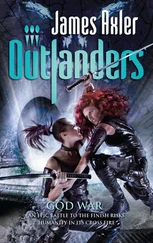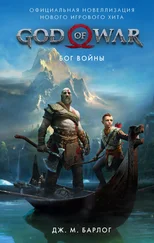The pack of them ran toward her. Raine’s face was dark. Nyx screamed, “My life for a thousand!” and pounded on the door again. There was nothing easier to shoot than a stationary target.
Anneke was a hand breadth away. She reached for Nyx’s hair.
The magicians’ door opened. A waft of cold air billowed into the alley, bringing with it the stink of sweat and leather. Nyx fell inside, into darkness. She tucked her feet underneath her, pulling them across the threshold.
“Fuck!” Anneke said again.
Nyx lay at a pair of bare feet cloaked by yellow trousers. She heard a low buzzing sound, and a soapy organic filter popped up over the doorway. Through the filmy gauze of the filter, Nyx saw Raine standing behind his crew, her burnous still in his hand.
She looked up the length of billowing yellow trousers and into the sapphire-eyed face of Yah Reza.
“You’re bleeding all over my floor, baby doll,” Yah Reza said, and shut the door.
Rhys had never fought at the front. He’d been through it, yes. But he had never picked up a blade or a burst or dismembered a body. He had gone to great lengths to avoid doing so.
He had once walked across a rubbish-strewn street with his father, anxious to keep up with the long-legged man, and some piece of glass or serrated tin had lodged in his shoe. He had kicked free of it and limped on despite the pain. When he arrived home after morning prayer, he had pulled off his shoe and found it full of blood. It had taken his mother and sisters nearly a quarter of an hour to stir him from a dead faint, and by then they had cleaned and bandaged the wound. He did not look at it again until the skin had healed clean. He threw out the shoes.
When Rhys crossed the great churning waste of the desert, he’d been running not toward his father but away, across the disputed border between Chenja and Nasheen. The sky had lit up every night with deadly green and violet bursts. The world had smelled of yeast and mustard and geranium. He had stayed as far from the contagion clouds as possible, but when he stumbled through Chenja and into the nearest Nasheenian border town, he was hacking up his lungs in bloody clumps, and his skin burned and bubbled like tar.
What woman took him in then, he did not know, but he knew it was a woman. Everyone alive in Nasheen was a woman. They sent all their men out to die at the front. They had no family heads, no clans. They were godless women who murdered men and bred like flies. The Nasheenians took him for a deserter, but because they called in their magicians before they called in their order keepers, they had saved him from a cold, bloody death in an interrogation room somewhere in the Nasheenian interior.
The magicians had arrived with sleeves full of spotted fungus beetles and cicadas in their hair, and when Rhys next opened his eyes, he was in a bed at the center of a circular room deep in the magicians’ quarters. A lightning bug lamp beside him brightened and dimmed, brightened and dimmed, until he thought his vision must have been lost somewhere in the desert along with his name. He moved his hands over the lamp, and the bugs ceased their intermittent dance and glowed steadily.
“Is it better or worse, in the light?” one of the magicians had asked, emerging from the darkness of the doorway. From the raised bed, he could see that the doorway opened into more blackness.
The woman magician spoke to Rhys in accented Chenjan, and she had brought him a strange still-wriggling stew of grubs and gravy. She was a tall, bony woman with eyes the color of sapphire flies; not their real color, she assured him.
“We know a thing or two about illusion in Nasheen,” she had told him. He remembered how strange it was to see her eyes at all. He had heard that Nasheenian women did not wear veils, but he still found her vanity surprising, decadent. Chenjan women could submit to God and wield a rifle with equal ease, but Nasheenian women had allowed their propensity for violence to pollute their beliefs. Wielding a rifle, they believed, made them men in the eyes of God, and men did not have to practice modesty or submission to anyone but God. Nasheenian women had forgotten their place in the order of things.
The woman’s mouth had worked constantly at the wad of sen she kept in it. Her teeth were stained a bloody crimson. She turned to the lightning bug lamp and laughed.
“You’ve figured it all out, haven’t you, baby doll?” she had said, gesturing at the bugs. “We may find some use for you yet.”
It was then that he realized he had asked the bugs to light the room, something only a magician could do. They knew what he was, then.
Her name, she said, was Yah Reza. She said she would help him work on his Nasheenian and that hiding his ability with bugs from another magician would have been like trying to pretend he wasn’t Chenjan. She could see the difference. Now, she had said, he was hers, unless he wanted some other life—wanted to get sold off to gene pirates or the breeding compounds, or become a venom dealer or some mercenary’s translator.
“There are worse fates,” she had said, and something on the stuccoed wall behind her had shifted, and Rhys realized it was an enormous butterfly, big as his hand. “But I can make you a magician.”
A magician.
A Nasheenian magician.
“One that can practice in Nasheen?” he had asked, because he could not go back to Chenja. Something in his chest ached at the thought of it.
He remembered rubbing at the backs of his hands where his father had beaten him with a metal rod when he had refused him. But the magicians had healed those wounds as well, and the skin and bones were mended now, erasing the physical history of that night, those words. But not the memory. His or God’s.
“I can even get you a proper sponsor, once you’re trained. Better, I won’t ask what brought you across the border in the dead of night or how you did it. You get on with the magicians, you get immunity from the draft and the inquisition. What do you think of that?”
Rhys did not fear the Nasheenian draft—Nasheenians didn’t draft foreign men—or the inquisition; he was too smart for them. But Yah Reza offered him magic. In Chenja, to reveal his skill would have meant immediate training for the front, no matter that he was his father’s only son. As a standard, his father’s lack of sons had given Rhys a place at home. Men still headed families in Chenja. They still owned companies, acted as mullahs, ran the government. But as a magician, he would have been forced to the front.
“I’ll stay,” he had told her.
He spent some months among the magicians, learning the intricacies of bug manipulation and organic tech. His Nasheenian improved. He learned to look away from the women in the hall as he passed. They stared at him openly, like harlots. It was up to him to allow them to maintain some shred of honor. When he asked to leave the cavernous labyrinth of the magicians’ quarters and boxing gym to go sightseeing in Faleen, Yah Reza told him he was not yet ready. She encouraged patience. But her words did nothing to distill the growing sense that he was a prisoner there, kept at the discretion of Nasheen’s magicians until he proved worthless or useful. He did not know what they would do with him when they decided which he best embodied.
Yah Reza caught him by the elbow one afternoon as he hurried back to his rooms after another embarrassing encounter with a magician teaching him transmission science. He was not used to a world where women put their hands on him without reservation and regarded him as if he were a young but dangerous insect. Chenja was full of women, of course, but no Chenjan woman had ever grabbed him in the street, not even the lowliest of prostitutes. And no Chenjan woman had ever done the things to him that the women in the border towns had done before their magicians showed up. They would not have dreamed of it. They would have been killed for it.
Читать дальше
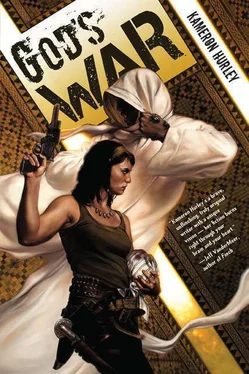
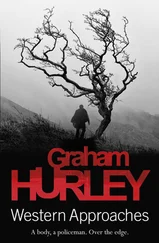
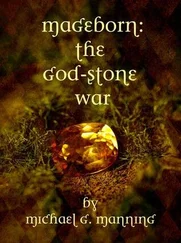



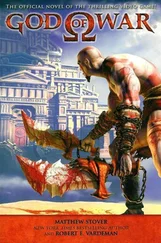

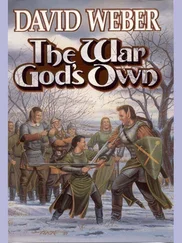
![Дж. М Барлог - God of War. Бог войны [Официальная новеллизация] [litres]](/books/413051/dzh-m-barlog-god-of-war-bog-vojny-oficialnaya-no-thumb.webp)
